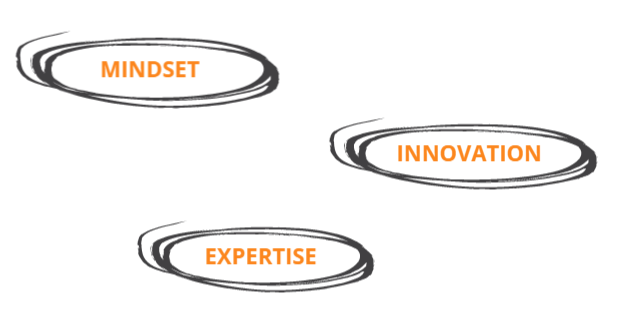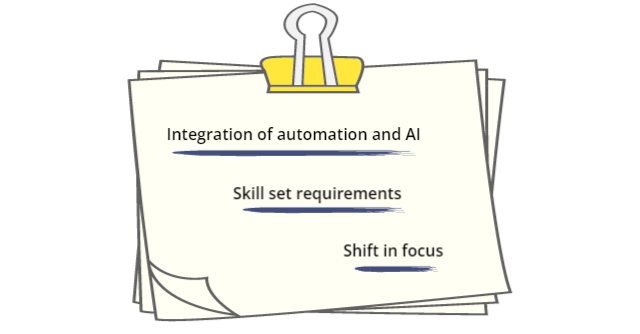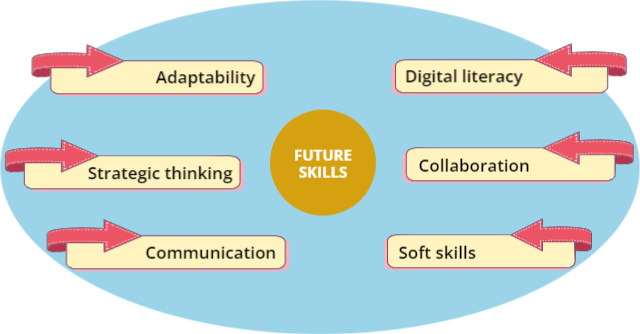Unprecedented advances and transformative trends are reshaping leadership in technology sector. As the rapid pace of technological innovation continues, the tech industry faces unique challenges and opportunities. The intersection of artificial intelligence, automation and data-driven insights demands visionaries who can effectively navigate this complex landscape.
Resilient, agile and future-focusing executives will be instrumental in driving digital transformation, fostering innovation and harnessing the potential of emerging technologies. As organizations strive to remain competitive, leaders must possess a deep understanding of the evolving technological landscape coupled with strategic thinking and adaptability.
Furthermore, ethical considerations, diversity and inclusion and the ability to effectively manage and inspire teams in a remote and globalized work environment are becoming increasingly crucial.
In this report, we discuss the most significant drivers of the change while providing actionable steps that will help steer you through this rapidly evolving environment.

Artificial intelligence, blockchain, the Internet of Things, and augmented reality are disrupting industries, revolutionizing processes, and redefining business models. The ability of technology leadership to understand and harness the power of these technologies will be critical for success.
To thrive in this dynamic environment, chief technology officers can take several steps:

Adaptive leadership is, effectively, the ability to anticipate, embrace, and respond effectively to changes brought about by technology.
This is achieved by cultivating a mindset that values learning and embraces challenges. In a nutshell, that means that you see setbacks as opportunities for growth and seek feedback to continuously improve your skills and knowledge.
The opportunities mostly arise as a result of fostering a culture of innovation. In other words, encourage experimentation, creativity and open exchange of ideas within your team or organization. Most importantly, create a safe space for taking calculated risks and motivate your engineers to really think outside the box.
You should also make every effort to develop cross-functional expertise. Expand your knowledge beyond your specific domain by developing a broad understanding of various technologies, industry trends and market dynamics. This interdisciplinary approach will enable you to adapt more effectively to new challenges and identify opportunities.
Years of free money and an almost frantic pursuit of growth are now over. VCs and Wall Street are now focusing on profitability and sustainability which, for those fresh in their leadership roles, means playing a whole new type of game. Being a cross-disciplinary expert will help steer you through this new environment.
AI and automation have been catalysts for the change, fundamentally altering the way organizations operate and transforming traditional leadership responsibilities. Several factors have contributed to this:

Increasing integration of automation and AI lately
This integration has enabled organizations to automate repetitive tasks, improve operational efficiency, and enhance decision-making processes. Consequently, it is forcing CTOs to understand and leverage these technologies effectively.
Evolving skill set requirements
We are talking about a deep understanding of AI algorithms, data analysis, machine learning, and emerging technologies to drive innovation and make strategic decisions.
Shift in focus
Chief technology officers are now shifting their focus from overseeing manual processes to leading and managing AI and automation initiatives. This includes identifying opportunities for implementation, ensuring the ethical use of AI, and fostering a culture of innovation.
Tech leaders who fail to adapt may risk becoming obsolete or face challenges in effectively leading their teams. On the other hand, embracing the reshaped role can yield benefits such as improved operational efficiency, enhanced decision-making, and increased innovation.
Increasing integration of automation and AI
This integration has enabled organizations to automate repetitive tasks, improve operational efficiency and enhance decision-making processes. Consequently, it is forcing CTOs to understand and leverage these technologies effectively.
Evolving skill set requirements
We are talking about a deep understanding of AI algorithms, data analysis, machine learning and emerging technologies to drive innovation and make strategic decisions.
Shift in focus
Chief technology officers are now shifting their focus from overseeing manual processes to leading and managing AI and automation initiatives. This includes identifying opportunities for implementation, ensuring the ethical use of AI and fostering a culture of innovation.
Tech leaders who fail to adapt may risk becoming obsolete or face challenges in effectively leading their teams. On the other hand, embracing the reshaped role can yield benefits such as improved operational efficiency, enhanced decision-making and increased innovation.
To adjust, consider these steps:

These skills encompass a range of competencies, including:
To speed up the acquisition of these vital skills, you can employ several strategies:
Equipped with these competencies, you can lead your team and organization to embrace emerging technologies, seize opportunities and drive sustainable growth in the dynamic technology landscape.
One of the primary challenges is the need to balance traditional IT responsibilities with driving innovation and strategic decision-making. CTOs must shift their focus from purely technical expertise to understanding the broader business implications of digital transformation. In other words, you need to align technology initiatives with organizational goals, collaborate with cross-functional teams and drive cultural change.
It is, basically, a shift from a purely technical role to that of a strategic business partner. You, therefore, must understand emerging technologies, data analytics, customer-centricity and digital trends.
The fastest way for you to adjust to this evolution involves:
This way, you are becoming instrumental in driving digital transformation initiatives, guiding your organisation through technological disruptions and positioning yourself as a strategic leader who can effectively leverage technology to achieve business objectives.
Several capital risks arise in this domain:
The collection and use of vast amounts of personal data can pose privacy and security risks. Solutions include:
Addressing this risk involves:
The opacity of AI systems can make it difficult to understand and explain their decisions. You can mitigate this risk by:
The automation enabled by AI can lead to job displacement and social implications. To prevent negative impacts:
The three biggest challenges in leading AI and data-driven technologies right now are:
The question is, how do you address these three challenges in an optimal way?
There are four initiatives that you can employ almost immediately:
Technological advancements, market conditions and business landscapes are constantly changing, making it challenging to predict outcomes and plan with certainty.
Consequently, a CTO must adapt, persevere and lead effectively in the face of ambiguity and change.
Therefore, to best prepare for uncertainty, consider taking the following steps:
When we observe this challenge from the perspective of the technology industry as a whole, the process of building resilient tech leaders implies:
Now, while it may not be possible to turn the unknown into the known completely, technology leaders can reduce uncertainty by engaging in market research, customer feedback and industry analysis. Cumulatively, this approach provides valuable insights to inform strategic planning and reduce uncertainty to an acceptable degree.
Leadership in technology sector is evolving rapidly, driven by factors such as emerging technologies, digital transformation and the need for ethical considerations. To thrive in this dynamic landscape, future leaders must adapt and develop the necessary skills and mindset.
In a nutshell, there are 7 tenets — the 7 key takeaways — of future leadership in the tech industry:

By adopting these seven tenets, aspiring and current tech leaders can position themselves as effective leaders in the tech sector. They will be well-equipped to navigate disruptive innovations, foster innovation and lead their teams and organizations towards success in an ever-changing landscape.
90 Things You Need To Know To Become an Effective CTO

London
2nd Floor, 20 St Thomas St, SE1 9RS
Copyright © 2024 - CTO Academy Ltd